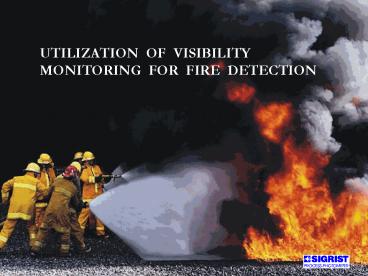Kein Folientitel - PowerPoint PPT Presentation
Title:
Kein Folientitel
Description:
In-situ instruments are normally already mounted about 3 meters above the ground ... concerning the instrument density and mounting place have to be considered ... – PowerPoint PPT presentation
Number of Views:47
Avg rating:3.0/5.0
Title: Kein Folientitel
1
UTILIZATION OF VISIBILITY MONITORING FOR
FIRE DETECTION
2
BASICS OF VISIBILITY MONITORING
Continuous measurement of visibility and
CO-concentration has been used for ventilation
control in road tunnels for almost 40 years
3
BASICS OF VISIBILITY MONITORING UNIT
- Visibility is measured in units expressing the
extinction of light over a certain distance, E/m
(extinction per meter) or, more convenient, mE/m
(milli-extinction per meter) - 1 mE/m means the light intensity is reduced by a
factor of 10 over a distance of 1000 meters
4
BASICS OF VISIBILITY MONITORING TYPICALLY
MEASURED VALUES LIMITS
Normal Traffic lt 5 mE/m Heavy Traffic
5 mE/m Traffic Jam 7 mE/m Closing
of the tunnel 12 mE/m Fire gt
15 mE/m
5
VISIBILITY MONITORING AND FIRE DETECTION
WHAT IS MEASURED?
- Visibility measures
- In normal operation
- Soot from exhaust fumes, wear debris from the
tires, dirt particles, etc. - In case of a fire
- Soot particles and other products produced by
the fire - Fog / Water steam (not desired!)
6
VISIBILITY MONITORING AND FIRE DETECTION
COMPARISON WITH FIRE SENSOR CABLES
- Fire sensor cables measure the temperature and
react either above approx. 50C or at a certain
temperature gradient. In case of a fire, these
conditions are only achieved in an advanced
stage. - Visibility monitoring also detects cold smoke,
typically produced in an early stage, or in case
of a smoldering fire - Advantage visibility monitoring it enables
earlier warning!
7
VISIBILITY MONITORING AND FIRE DETECTION
EXPERIENCE FROM FIRE INCIDENTS
- The visibility values increase quite quickly over
15 mE/m, however, this information was not used
for fire detection - In the worst case, more fresh air is pumped into
the tunnel by the ventilation system, based on
the assumption that the emission is too high - Consequences the fire gets more oxygen and the
smoke is distributed in the tunnel
8
SMOKE DETECTOR FIREGUARD
- Measuring principle stray light
- No moving parts
- Response time T90 in 5 second
- Integrated temperature sensor
- Fog elimination with heating elements (option)
- Signal output via relays or Profibus DP
- Installation on the wall, ceiling or in the
intermediate ceiling of the fresh air channel
9
FIREGUARD INSTALLATION WALL MOUNTING
10
FIREGUARD INSTALLATION MOUNTING ON THE
CEILING
11
FIREGUARD INSTALLATION MOUNTING IN THE
INTERMEDIATE CEILING
12
CONSEQUESCES FOR THE VISIBILITY MONITOR
INSTALLATION POINT
- Where is the most ideal place for the system
installation?
13
CONSEQUENSES FOR VISIBILITY MONITORING
INSTALLATION POINT
- Smoke is normally concentrated under the ceiling
- In-situ instruments are normally already mounted
about 3 meters above the ground - Suction points for extractive instruments should
also be mounted at the same height (currently
theyre about 1.5 meters above the ground)
14
CONSEQUENSES FOR VISIBILITY MONITORING
INSTALLATION POINT
15
CONSEQUESCES FOR THE VISIBILITY MONITOR
ALARM LEVEL
- What signal levels can be expected during normal
operation and in case of an incident?
16
CONSEQUESCES FOR THE VISIBILITY MONITOR
ALARM LEVEL
17
CONSEQUESCES FOR THE VISIBILITY MONITOR
ALARM LEVEL
Zoom after approx. 30 to 60 seconds, depending
on the distance of the visibility monitor from
the fire, a limit of 30 mE/m has been exceeded.
At the same time it could be demonstrated, that
30 to 50 m/Em is a realistic threshold for a
smoke alarm
18
FIREGUARD FIELD TEST GOTTHARD
Zoom The instruments FireGuard ceiling 1 und
FireGuard prototype (wall) give an alarm more or
less simultaneously the instruments FireGuard
ceiling 3 (200m distance) and 4 (300m) react with
a delay of 22 and 58 seconds, respectively.
19
FIREGUARD FIELD TEST NORWAY
The Norwegian Road Authority conducted a fire
test in Norway (Runehamar) to compare the
reaction and sensitivity of fire detection
systems based on optical cables and stray light.
The test demonstrated that both system detect
fire quickly and reliably. However, stray light
instruments detected the start of the car fire 2
½ minutes earlier (because there was only smoke
in the beginning)
20
FIREGUARD FIELD TEST NORWAY
Direct fire (untypical) of 1 MW Immediate
response of the sensor cable, followed by the
FireGuard. Note a competitive unit made a
self-test during the start of the fire and missed
it!
21
FIREGUARD FIELD TEST NORWAY
Direct fire (untypical) of 0.1 MW Sensor cable
and FireGuard give alarm at about the same time.
However, the alarm level for the sensor cable is
based on very small temperature changes, hence
theres a higher risk of a false alarm!
22
FIREGUARD FIELD TEST NORWAY
Car fire (realistic incident) FireGuard
triggered alarm after approx. 40 sec. The sensor
cable only after more than 3 minutes! This is
because in the beginning there was only smoke (in
90 this is the case!)
23
FIREGUARD FIELD TEST NORWAY
Car fire (realistic incident) This graph shows
now the temperature signal. The sensor cable
reacted just a little bit before the temperature
sensor which is built in the FireGuard.
24
VISIBILITY MONITORING IN ROAD TUNNELS
SUMMARY
- Visibility monitoring is now used not only for
the ventilation control, but also for early fire
detection - It allows to detect smoke and smoldering fires in
an early stage - Real fires are typically detected 2 to 3 minutes
ahead of fire sensor cables - For the installation, new requirements concerning
the instrument density and mounting place have to
be considered - Alarm levels for fire detection must be defined
individually for each tunnel.































